Across approximately 25 percent of Pittsburgh, sewage and stormwater are routed into separate underground sewer pipes. When it rains, stormwater enters inlets along our roadways and other surfaces, and the storm sewer pipes send the stormwater directly to our streams and rivers.
Unfortunately, that stormwater picks up litter, oil, road salt, and other pollutants on the ground before flowing through storm drains to our streams and rivers. This pollution harms local water quality, fish and wildlife, and recreation.
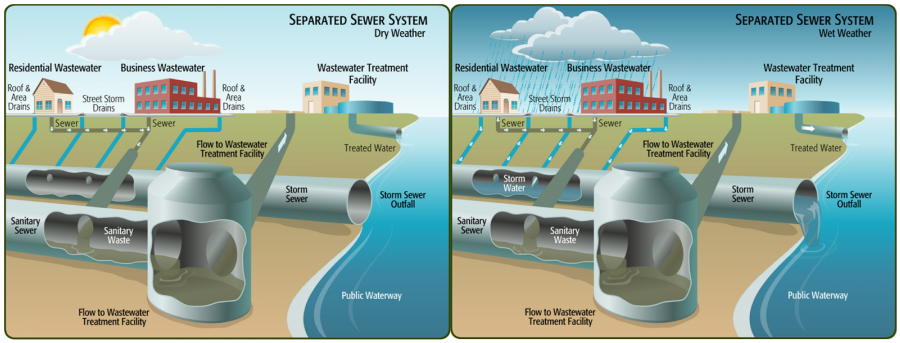
Federal and state law help protect and restore rivers and streams by regulating this stormwater pollution. The City of Pittsburgh and PWSA have a Municipal Separate Storm Sewer System (MS4) permit from the Pennsylvania Department of Environmental Protection (PA DEP). This permit requires that we develop and implement a Stormwater Management Program (SWMP) to reduce the discharge of pollutants from the separate storm sewer system. This is managed under six Minimum Control Measures, which focus on:
- Public education and outreach
- Public involvement and participation
- Illicit discharge detection and elimination
- Construction site stormwater runoff control
- Post-construction stormwater management
- Pollution prevention and good housekeeping of PWSA and City of Pittsburgh operations
Public education and involvement are essential to the success of our MS4 program. PWSA is actively providing the public with opportunities to learn about our MS4 Stormwater Management Program (SWMP) and is taking steps to discuss the negative effects of illicit discharges. An illicit discharge is any discharge to the municipal separate storm sewer system that is not composed entirely of stormwater. It is important for the public to understand what they are, the City Ordinances that define them, how they can be eliminated, and the actions they can take to report an observed or suspected illicit discharge. See the Actions You Can Take section below for more information.
To meet these water quality goals, the City and PWSA are strengthening their partnership and are expanding the existing stormwater management program in Pittsburgh. The expansion of this program includes mapping of the entire separate sewer system (inlets, outfalls, observation points, piping, roads, streams, etc.), establishing an inventory of sources of pollution, and investigating and inspecting outfalls and contributing areas based on that inventory or in response to reported illicit discharge concerns.
In watersheds that are designated by the state as impaired, like Saw Mill Run, we are constructing infrastructure projects that capture and filter polluted stormwater and reduce sediment. Recently completed projects that meet these goals include the Volunteers Field Rain Garden Project, and the Saw Mill Run Stream Restoration Project.
Stormwater Information Session
Resources
You may request a copy of our Permit, Stormwater Management Plan, Annual Reports, or maps by filling out our Report an Issue webform and noting what documents you are requesting in the description field. Learn more about our stormwater management program in these reference sheets:
- Stormwater Management and Water Conservation
- Preventing Stormwater Pollution in Our Municipal Operations
To learn more about the Pennsylvania Department of Environmental Protection (PA DEP) MS4 permitting program please visit their Municipal Stormwater website.
The MS4 program is a national program established by the EPA. To learn more about this nationally required program please visit the federal Stormwater Discharges from Municipal Sources website.
Help Reduce Stormwater Pollution
A little bit of litter on the street might not seem like a big deal, but everyone’s pollution adds up. We all can take simple actions every day to help protect our streams and rivers and keep our neighborhoods clean. Together, these small positive actions can make a big difference!
Actions You Can Take
Everyday Actions
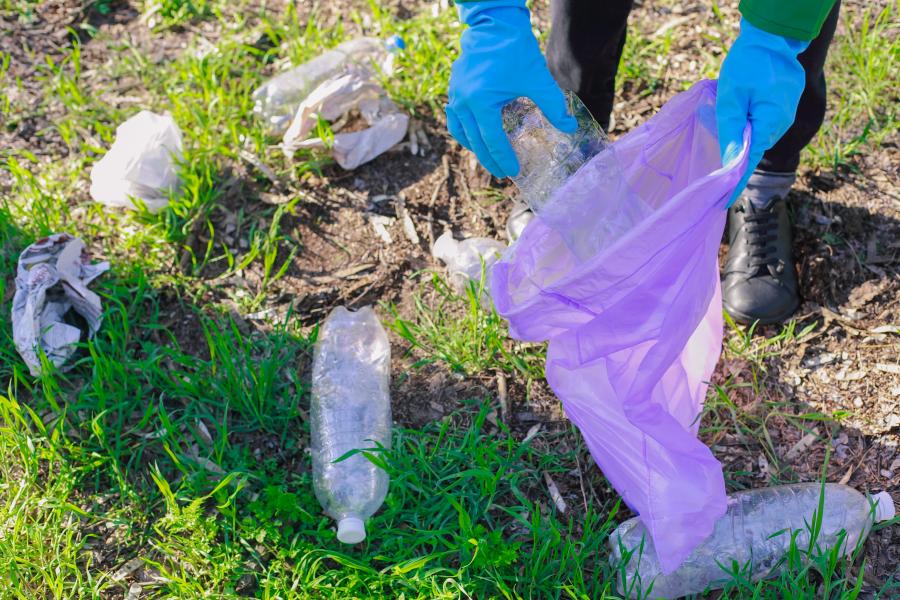
- Don't litter and do pick up litter if you can do so safely. Dispose of trash and recycling properly so that it doesn't clog our storm drains, pollute our rivers, and harm fish and wildlife.
- Stop any oil leaks from your car immediately, since even a little bit of oil can pollute a lot of water.
- Do not over-apply pesticides, since any excess gets washed away into our streams and rivers, harming fish and wildlife.
- Make sure bare soil is covered, leaves are raked, and trash is separated from yard wastes so that it doesn't wash away and smother fish and wildlife in streams and rivers.
Prevent and Eliminate Illicit Discharges to Storm Sewers
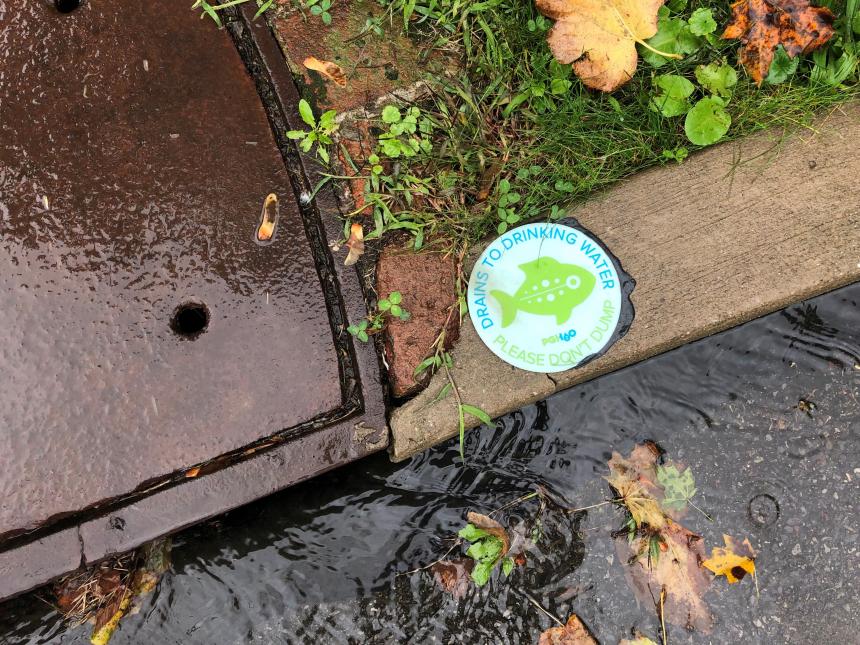
Did you know that we have more than 25,000 storm drains in Pittsburgh that lead to our sewer system, streams, and rivers?
You can help reduce river pollution, illicit discharges, and street flooding by following these best practices:
- Never dump vehicle fluids, grass clippings, leaves, household chemicals, paint, animal wastes, car washing soaps, litter, or fats, oils, and greases into storm drains, since that leads to pollution in our streams and rivers and clogs in our sewer system.
- In addition to dumping, do not connect sanitary, restaurant waste, or industrial wastewater lines to the storm sewer system.
- All of these types of dumped materials or connections are examples of illicit discharges and are prohibited from entering the storm sewer system per our MS4 permit.
- Only the following uncontaminated water sources are permitted to enter a separate storm sewer: water used for firefighting, fire hydrant and water line flushing, flows from wetland habitats, lawn watering with unchlorinated water, groundwater, HVAC condensate, and residential vehicle wash water (if only water is used), dechlorinated swimming pool discharges, uncontaminated water from foundations or from footing drains, and water from crawl space pumps.
You can sign up with Allegheny CleanWays to adopt a storm drain in your neighborhood! Register to be a GrateKeeper at www.alleghenycleanways.org/get-involved.html and they’ll provide the information you need to get started.
Report Illicit Discharges and Storm Drain Issues
The City of Pittsburgh has ordinances prohibiting illicit discharges and provides for enforcement action if an illicit discharge is discovered. Similarly, the Allegheny County Health Department (ACHD) has regulations regarding proper use of sanitary and stormwater sewers.
The public is a critical part of removing pollution from our rivers. If you witness or suspect an illicit discharge is entering the storm sewer system:
- Please call our 24/7 Dispatch at 412-255-2423 (Press 1) or fill out our Report an Issue webform so that we can investigate.
- Please provide an address or cross street for the location.
- A photo of the storm drain and any dumped materials or pipe connections are also very helpful.
If you witness a clogged or broken storm drain:
- Never reach inside a storm drain or lift the grate.
- Please report in the same manner as an illicit discharge, or send us a photo @pgh2o on Twitter.
Tidy Up Yard Waste
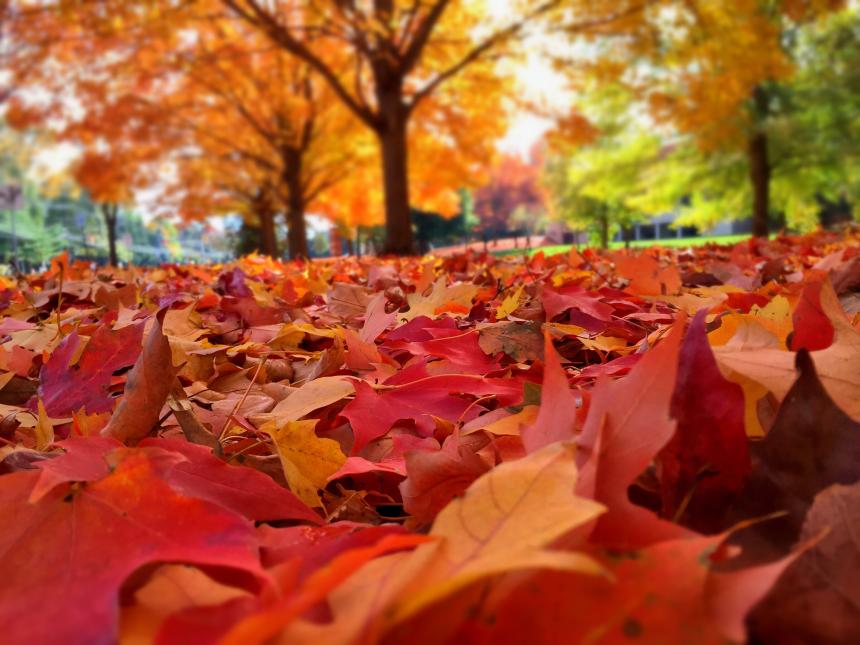
Yard waste left on the ground can block and clog storm drains, contributing to street flooding when it rains. Excess leaves and grass clippings can also cause nutrient pollution and oxygen depletion in our streams and rivers when carried there through storm drains and sewer pipes, which harms fish and other wildlife.
Do your part to help protect storm drains and streams:
- Do not rake or blow leaves or grass clippings off your property into the street.
- Do not pile leaves or other yard waste near storm drains.
- A City ordinance requires that all leaf waste be separated from municipal waste.
- Place your leaves in a bag for curbside yard debris collection or compost them at home.
- If you have a mulching lawnmower, use it to recycle leaves and their nutrients into your lawn.
- If composting at home, be aware of our City's composting ordinances and make sure your compost is contained and drainage is controlled. Never add animal products or animal wastes to your compost and avoid adding synthetic fibers like plastic.
Fertilize Sparingly
Fertilizers may help your garden or lawn grow, but nitrogen and phosphorus, nutrients found in fertilizers, can harm downstream water quality. When it rains, any fertilizer nutrients that haven’t been used by plants are washed away into our streams and rivers. These nutrients can cause excessive growth of algae and aquatic weeds. Algae reduce the amount of oxygen in the water, which kills fish and aquatic wildlife.
Instead:
- Only fertilize if necessary and do not overapply.
- Use a soil test to measure existing nutrient levels.
- If your soil phosphorus levels are adequate, select a phosphorus-free fertilizer.
- Select slow-release and organic fertilizers, which are less likely to wash away.
- Spread grass clippings over your lawn to provide needed nitrogen to soil.
- Fertilize lawns in the fall to promote root growth and prevent nutrients from washing away during spring rains.
Pick Up Pet Poop
Pet poop left on the ground isn’t just a smelly nuisance – it also harms human health and the environment, and the City of Pittsburgh's ordinance calls for waste to be disposed of properly. When it rains, pet waste on the ground is washed away into storm drains and pipes to our streams and rivers. Water contaminated by pet waste is unsafe for swimming or other recreational activities, since the bacteria, parasites, and viruses in pet waste can cause serious health problems in humans. The nutrients in pet waste can also cause algal blooms and reduce oxygen levels in the water – harming fish and other wildlife.
Instead:
- When walking your pet, always bring a bag to scoop up waste. You can tie bags to your pet’s leash or store a few in your car.
- Don’t let your pet use streets, sidewalks, or other paved areas as a bathroom - choose a grassy area instead.
- Make sure to clean up after your pet in your own yard, especially before it rains.
- Dispose of bagged pet waste in a trash can. Never place in a compost pile.
Wash Your Car Properly
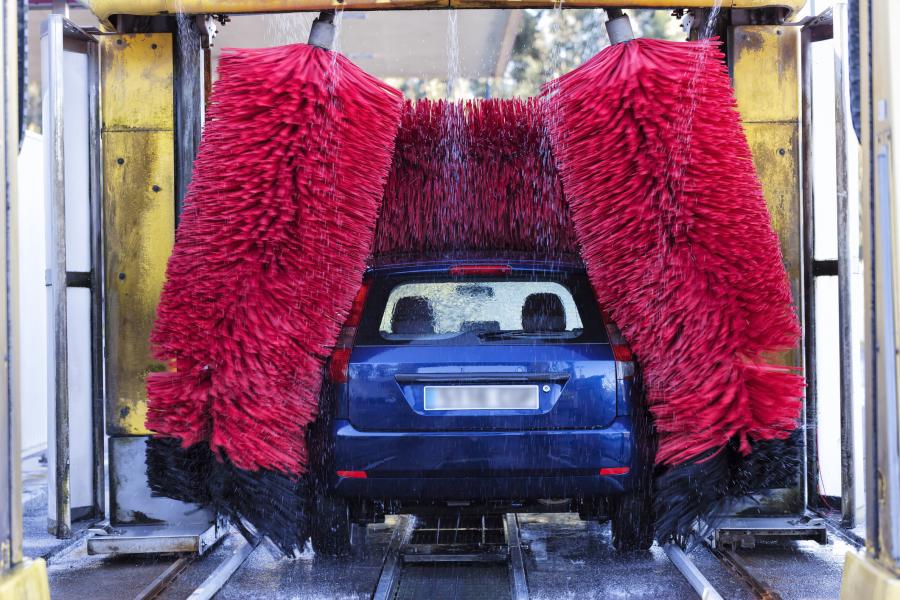
Washing your car in a driveway, parking lot, or street causes all the soap, dirt, salt, oil, and grease to flow into a storm drain and end up as pollution in our streams and rivers.
Fish and other aquatic life are harmed by the harsh detergents used to clean our cars. The soap also contains phosphates which cause excess algae to grow, resulting in smelly, green cloudy water that is unhealthy for the things that live in the water.
Not only do soaps dissolve grease, but they also damage the film on fish which protect them from harmful bacteria and parasites. Soap harms the gills of fish and even very small amounts of soap kill fish eggs.
Instead:
- Take your car to a commercial car wash, which is required to treat the dirty wash water and dispose of it properly.
- Commercial car washes also use clean water more efficiently and recycle wash water when possible, reducing water waste.
Selectively Apply De-Icing Salts
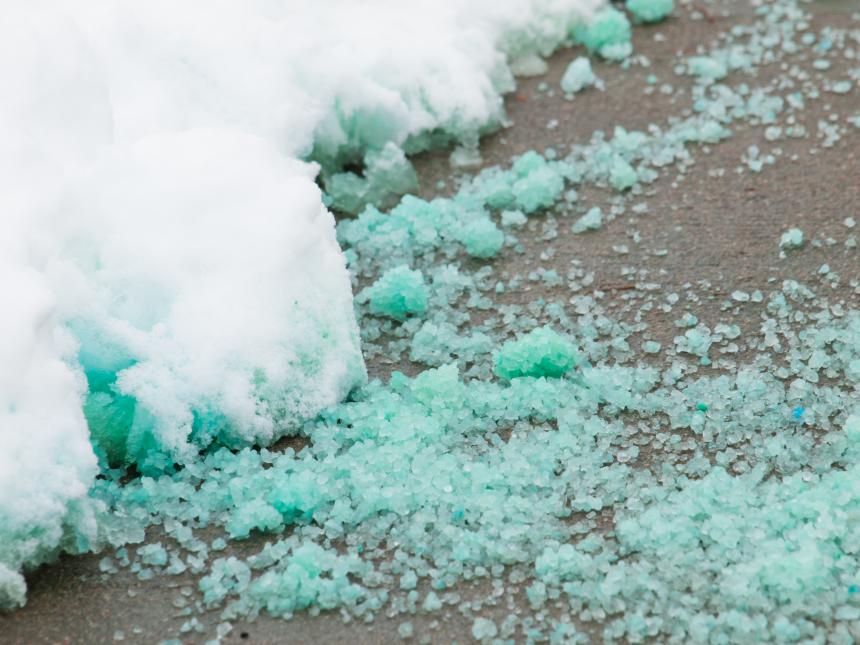
When de-icing salts are applied to roads or sidewalks, they lower the freezing point of water on the pavement, which melts or prevents the formation of ice. While de-icing salts can improve safety, they also contain chemicals like chloride that can damage nearby plants, soils, and infrastructure. When these chemicals are carried away by melting ice or snow to our rivers and streams, they can harm the water quality and wildlife. One teaspoon of salt can pollute five gallons of water.
Follow these de-icing tips:
- Before salting, clear away as much snow and ice as possible with a shovel or broom.
- Apply salt sparingly on icy patches, leaving about three inches between salt grains. Focus on areas with high foot traffic.
- If there is salt left on the pavement after thaws, sweep it up and apply less next time.
- Minimize use of sodium chloride (also known as rock salt), calcium chloride, and potassium chloride because they release high amounts of chloride when dissolved in water. Instead, consider using magnesium chloride products, which release less chloride.
- To help reduce salt use, consider mixing in additives like beet juice or pickle juice.
- To increase traction, sprinkle sand with or without salt. Sweep up the sand later so that it does not clog storm drains or pollute rivers and streams.
Dispose of Household Wastes and Appliances Properly
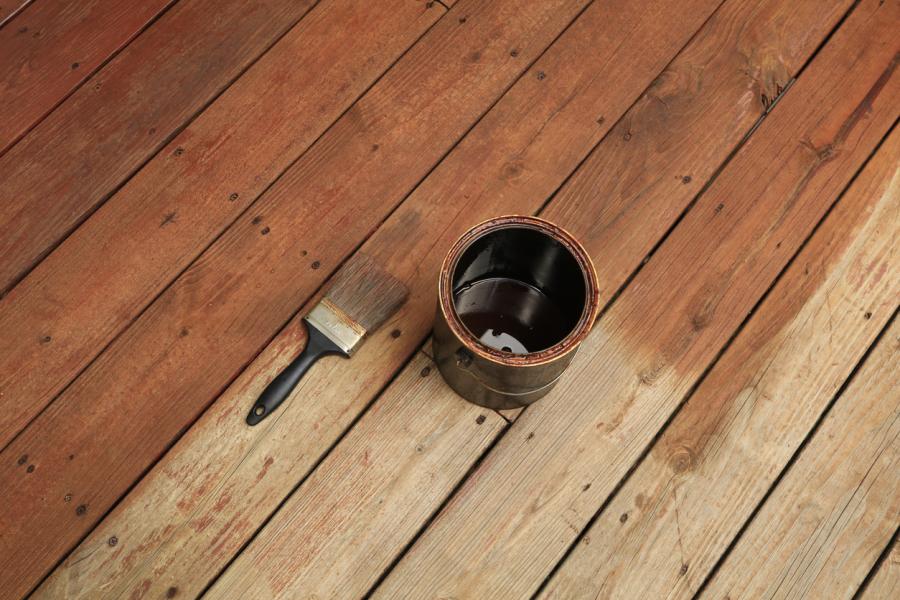
When it comes to the improvements made in and around the home, it's important to properly dispose of things like upholstered furniture, mattresses, carpets, yard waste, wood debris, and vehicle parts.
The City of Pittsburgh's ordinance on littering and dumping prohibits illegal dumping in any public place, right-of-way, vacant lot, private premise, sewer, or into the waters in the City.
Bulky items such as sofas, mattresses and carpets can be collected with your regularly scheduled refuse pickup. To check on other items that can be collected with your normal trash pickup, visit: The City of Pittsburgh Bulky Waste information page.
Unsure how to recycle hard to recycle items and electronics? Visit the DEP's Recycling and Waste Reduction webpage for resources.
When completing home repairs or maintenance that requires use of chemicals, it’s best to buy the smallest quantity needed get a job done of any strong chemicals such as paints, automotive fluids, pesticides, stains and cleaners. Doing so minimizes the risk of spills and of those chemicals entering the environment. You can also consider using less-hazardous alternatives.
Recycle Tires
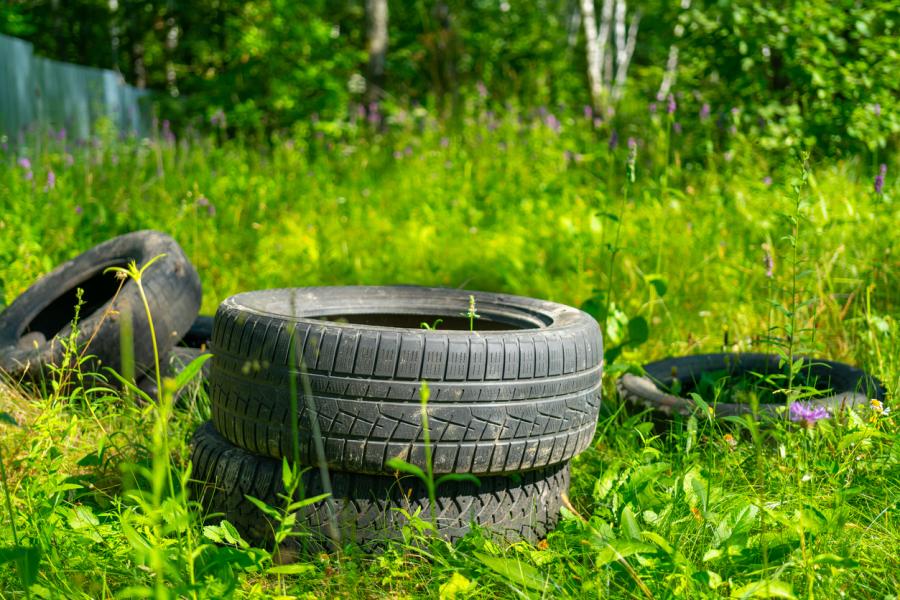
Improperly disposed waste tires are bad for the environment, public health and safety.
Stagnant water in tire piles can lead to mosquitos which pose various health threats. Waste tire piles can impede the stream and stream bank, contributing to flooding and can also cause substantial environmental harm if they catch on fire. If left to decompose on the ground, tires can pollute ground and surface water as the rubber degrades.
The City of Pittsburgh Public works operates an ongoing collection program at three locations around the city. To learn more about these locations as well as other resources related to the proper disposal and recycling of waste tires, visit the DEP's Waste Tire Program website.
Find Your Sewershed
Learn more about the separated or combined sewer area that you live in using our Find Your Sewershed webmap.
